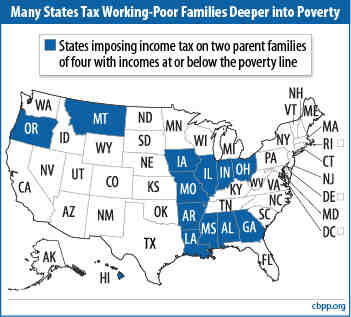Press Release: State Income Taxes Push Many Working-Poor Families Deeper Into Poverty
Some States Considering Scaling Back Tax Credits for Low-Income Working Families
Thirteen states taxed working-poor families deeper into poverty last year, according to a new report from the Center on Budget and Policy Priorities. In some of those states, poor families faced several hundred dollars in state income taxes — a significant amount for a family struggling to make ends meet, the report said.
Moreover, while some states implemented tax reductions for low-income working families in 2009 (usually enacted before the recession), progress has since ground to a halt because of state budget problems. In fact, some states have enacted or are considering reductions in tax credits for low-income working families, according to a companion report.
“States’ budget challenges are real, but so are the challenges that hard-working families are facing in today’s tough economy,” said Nicholas Johnson, director of the Center’s State Fiscal Project. “States have better ways to balance their budgets than to make their tax codes tougher on low-income workers.”
Some States Tax Families Well Below Poverty Line
The report found that in tax year 2009:
- In 13 of the 42 states that levy income taxes, two-parent families of four with incomes below the federal poverty line are liable for income tax (see map);
- In 11 states, poor single-parent families of three pay income tax;
- And 25 states impose income tax on families of four just above the poverty line.

Some states levy income tax on working families in severe poverty. For example, Alabama, Georgia, Illinois, Montana, and Ohio tax two-parent families of four earning less than three-quarters of the poverty line ($16,460).
In some states, poor families face several hundred dollars in income tax. In 2009, for example, a two-parent family of four with income at the poverty line owed $468 in Alabama, $266 in Hawaii, and $225 in Montana, according to the report.
Recession Threatens Recent Progress
The number of states levying income tax on working-poor families of four declined from 16 in 2008 to 13 in 2009; the taxes levied by those remaining 13 states also declined. But in the face of state budget problems, this progress has ground to a halt and some states have recently taken steps to cut back their credits, according to the companion report. For example:
- Virginia enacted a cut to its EITC that would raise taxes by $6 million on an estimated 114,000 low-income working families. (This cut might be reversed before it takes effect.)
- Minnesota cut back a renters’ credit affecting 300,000 low- and moderate-income households and eliminated a gas tax credit.
- Georgia is considering eliminating $22 million in wage support for 1 million workers earning less than $20,000 per year.
Similar measures have been proposed in New Jersey, the District of Columbia, and Montgomery County, Maryland.
Raising taxes on low-income working families is not the best option for raising state revenue, the report explains. Some states are considering such measures alongside proposals to cut taxes for wealthy individuals and corporations, which likely would neither strengthen the economy nor create jobs. States would be better off maintaining their low-income tax credits — which families spend quickly and locally, giving the economy a needed boost — while canceling other tax cuts and raising new revenue from higher-income families and profitable corporations.
The Center on Budget and Policy Priorities is a nonprofit, nonpartisan research organization and policy institute that conducts research and analysis on a range of government policies and programs. It is supported primarily by foundation grants.